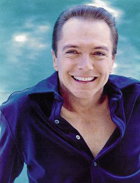
David Cassidy in the News
'Brothers' Draws Blood
A tough new musical opens
Friday, February 17, 1995
By Steven Winn
San Francisco Chronicle
It was launched as a theatrical volley aimed at the deepening class divisions of Thatcher's hard-bitten England in the early 1980s. Now, for a mid-'90s audience on this side of the Atlantic, Willy Russell's ``Blood Brothers'' casts new shadows as a foreboding musical parable on the perils of Newt Gingrich's America.
The touring Broadway production, starring David Cassidy as a doomed member of Liverpool's underclass and Petula Clark as the mother powerless to save him and his twin brother (played by Tif Luckenbill), opened Wednesday at the Golden Gate Theatre.
Deliberate, unabashedly melodramatic and as close to agitprop as a West End-Broadway musical gets, ``Blood Brothers'' exerts a peculiar hold even as it tries your patience. It's a balance that requires great, audacious performances to make the show work. The generally good performances in this production, unfortunately, aren't good enough.
Everything about ``Blood Brothers'' feels claustrophobic, oppressive, leaden -- by design. Andy Walmsley's brick-walled public housing set and the gloom- and-glare palette of Joe Atkins' rock concert-style lighting set the visual tone.
The ominous pedal points, exhausted half-arias and repeated dirge-like reprises in Russell's pop- rock score and the clanging rhymes in his lyrics and dialogue for a grim reaper narrator dressed in undertaker's black (a vulpine Mark McGrath) underline the characters' inescapable fates.
Even what passes for a production number, a feverish scramble by a scrubby group of street kids, has a certain desperate grittiness. But if you're willing to submit to the bathos and tightly focused theatrical and musical language of the piece, ``Blood Brothers'' can get under your skin, especially in the more propulsive second act.
When Cassidy's broken and quavering Mickey confronts his conventionally prosperous twin, Eddie, who was adopted at birth and raised by a well-to-do-family, he asks the unanswerable question about the classes that ticks like a time bomb in ``Blood Brothers'' from beginning to end: ``How come you got everything and I got nothing?'' There aren't many musicals that risk being this direct or didactic.
DICKENSIAN TWISTS
Russell, best known for his plays ``Shirley Valentine'' and ``Educating Rita,'' hangs his story here on a premise and coincidences that Dickens might have relished. When Clark's already strapped Mrs. Johnstone discovers she's pregnant with twins just after her husband abandons her, she agrees to give one of the babies away to the infertile woman whose house she cleans. Priscilla Quinby is effective as the tightly wired Mrs. Lyons, a woman who observes her own life unraveling with a sickening sense of dread.
Unaware of each other's existence, Mickey and Eddie meet at age 7. Infatuated by their differences, of dress, speech and habits, they become blood brothers and eternal friends. When one family moves away to the country, -- a sudden splash of color and light replaces the sooty urban backdrop -- the other unwittingly follows. Add the powder keg of unemployment, crime and the benign neglect of the prison system and the spark of a girl (Yvette Lawrence) both boys love, and the explosion is inevitable.
At close to three hours, ``Brothers'' unfolds slowly under Bill Kenwright and Bob Tomson's direction as a studied flashback of foregone tragic conclusions. The actors play themselves as children in a slow first act and as carefree teenagers and damned young adults in the more precipitous second act. McGrath's rail-thin narrator looks on gravely and commenting with a savage wail. Cassidy offers a surprisingly complex pop voice that can rise to aching lyrical peaks. And his acting is earnest and creditable, as Mickey moves from exuberant boyhood to bashful youth to hunched paranoia, his voice slurred by anti-depressant tablets and defeat. But the performance lacks the fine-grained detail and heartbreaking conviction the London and Broadway Mickey, Con O'Neill, brought to the role. Clark's silvery pop voice has burnished with age, and she sounds right as a bemused welfare mother who can still hope for a ``Bright New Day'' and lead the mournfully indignant anthem, ``Tell Me It's Not True,'' that brings down the curtain with a full- throated lament. But there's something emotionally recalcitrant about Clark's Mrs. Johnstone that tamps down the pathos; Luckenbill's Eddie seems to draw her out a little more.
``Blood Brothers'' is an odd and risky show, angry, melancholy and uncompromising. When it works, the book's bluntness and the simplicity of the score can deliver some direct emotional hits. But being struck isn't the same as being caught up in the show.
